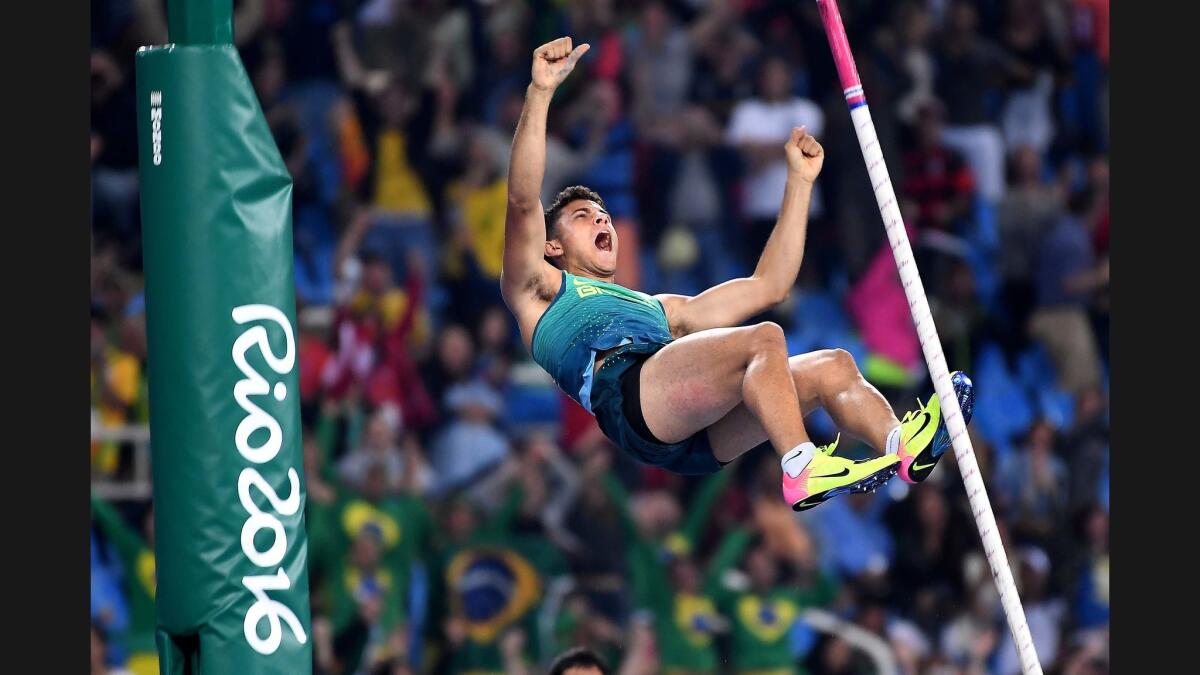Performances are strong but attendance is lacking at Olympic track and field

- Share via
Reporting from Rio de Janeiro — Jamaican sprinter Usain Bolt’s electrifying triple-triple, Briton Mo Farah’s distance double-double, and American runner Allyson Felix’s three-medal haul made a strong case that good things came in big bunches during the Rio Olympics track and field competition.
But progress also came in small but significant doses. Participants set three world records, eight Olympic records and more than 90 national records across 65 countries, a broad base that showed track and field is thriving on many levels despite the people who run it.
“Athletics has enthralled, it has entertained, it has captured the world’s imagination this week,” Sebastian Coe, president of the International Assn. of Athletics Federations, said Saturday. “We learned that our sport is alive and incredibly strong with a great appetite for public consumption. Competition has been of the highest quality. I can’t remember in living memory Olympic athletes that have come to the Olympics better prepared.”
Despite many spectacular performances, attendance at Olympic Stadium was dismal most days. Bolt was the only guaranteed draw, though events involving Brazilians, including gold-medal pole vaulter Thiago Braz da Silva, drew loud ovations. Coe said the lack of spectators didn’t indicate a lack of international interest.
“We live in a new world in the way that our sport is being consumed,” he said. “I know there has been a lot of discussion about the attendance levels in a lot of venues. I do make the point that actually, of course, that is not the way that most people view our sport, and I’ve seen it this week. We’ve had almost 100% more website users than in London. We’ve had mobile usage up by 361% on London. We stand strong, but we stand in a changing landscape.”
Bolt repeated Friday that he intends to retire, which would be a great loss to a sport that needs a dynamic attraction. But if he doesn’t come back as a sprinter or a decathlete — he gave javelin-throwing a try after his relay win Friday — triple Rio medalist Andre De Grasse of Canada appears ready to inherit Bolt’s role as the face of the sport.
De Grasse, a two-time NCAA champion at USC who won silver in the 200 meters, bronze in the 100 and bronze in the 400-meter relay in Rio, has the charisma and skill to appeal to old and new audiences.
“It has been an honor being a part of history with what he’s accomplished,” De Grasse said of Bolt. “Overall, if his time is up, a new person has to come in there. I have to continue to work hard and bring my ‘A’ game because it’s not going to be easy.”
The U.S. won the Rio track and field medal race with 32, its largest total in a nonboycotted Games since it won 35 in 1932. The total was evenly split between men and women.
Kenya had the second-most medals, 13, including six gold. Jamaica also won six gold, half of them from Bolt in the 100, 200 and 400-meter relay, and two from Elaine Thompson’s sweep of the 100 and 200 meters.
The U.S total in London was 28 track and field medals, plus a 400-meter relay silver that was taken away because of Tyson Gay’s positive steroids test.
The uptick was due in part to the doping-related absence of the Russian delegation (except for long jumper Darya Klishina), but the Rio success in middle-distance and distance races was brewing for a while.
Americans won seven medals in races 800 meters or longer, including Matt Centrowitz’s gold in the men’s 1,500 — the first by an American since 1908 — Jenny Simpson’s bronze in the women’s 1,500 — the first in that event for an American woman — and Galen Rupp’s marathon bronze.
“Distance running is so strong. In so many events there have been medals, and it’s been really inspiring to me,” said Kate Grace of Santa Monica, who was eighth in her first Olympic final.
“And this crew has been around for a while and has been slowly building. They’ve been doing this awhile. To see them having worked so hard and get to the top after years and years of hard work, it’s awesome. It’s heartwarming. That’s what the Olympics is about.”
helene.elliott@latimes.com
Twitter: @helenenothelen
Go beyond the scoreboard
Get the latest on L.A.'s teams in the daily Sports Report newsletter.
You may occasionally receive promotional content from the Los Angeles Times.




